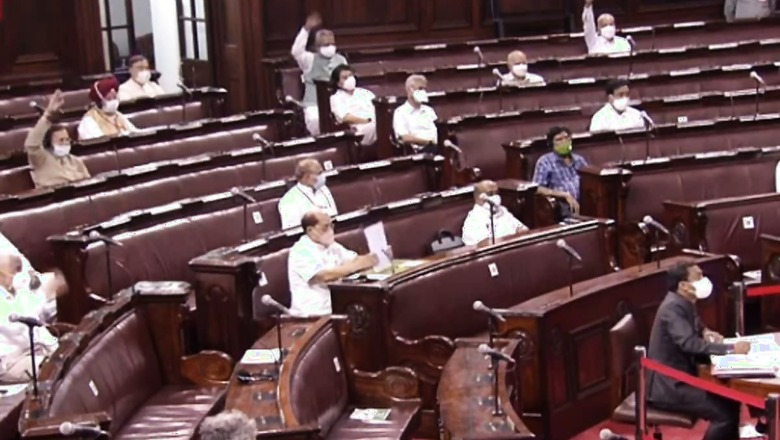
views
Political heat may be rising over three farm sector bills amid strident protests by the Opposition and revolt by the BJP’s oldest ally Shiromani Akali Dal, but the ruling party is confident that numbers are stacked in its favour in Rajya Sabha where these draft laws are expected to be tabled on Sunday.
Prime Minister Narendra Modi’s forceful defence of the three bills and blistering criticism of the Opposition for protesting against them on Thursday made it clear that he remains unfazed and that his government will press on to get Parliament’s nod for these measures aimed at opening private avenues for farmers to sell their produce. His assertion came amid Congress and several other parties besides the SAD coming out strongly against these bills, calling them “anti-farmers”.
Farmers in states like Punjab and Haryana have been protesting against these proposed laws which, their leaders allege, will end up dismantling the existing government-backed support system they have. While the BJP-led National Democratic Alliance is yet to have a clear majority of its own in the 245-member Rajya Sabha, many regional parties have backed it for the last several sessions to ensure passage of various legislations proposed by the government.
BJP leaders expressed confidence that they will get the support of over 130 members, including nine of the AIADMK, and seven of the TRS and six of the YSR Congress — all three of whom are not part of the ruling alliance, if a division of votes is sought on these bills. The BJP has the highest tally with 86 seats, followed by 40 of the Congress.
The three members of the SAD are sure to vote against the bills, but Shiv Sena, a former BJP ally and now in opposition, has expressed it support for these bills. The Maharashtra party has three members in Rajya Sabha. Several other regional parties, including three-member Aam Aadmi Party, Samajwadi Party with eight seats, and BSP with four, have joined the opposition’s ranks in protest against these bills but it may not prove enough to hinder their passage.
A number count of parties that have come out against these draft legislations suggests that there are as of now nearly 100 MPs opposing them. There is no clarity about the stand of some small parties which have around a dozen members put together. Since the Modi government assumed office for its second time in 2019, its rivals have not been able to scuttle any of its major bills due to a rise in the ranks of treasury benches and a corresponding fall in the opposition ranks.
The Farmers’ Produce Trade and Commerce (Promotion and Facilitation) Bill and the Farmers (Empowerment and Protection) Agreement on Price Assurance and Farm Services Bill were passed by Lok Sabha on Thursday, while the Essential Commodities (Amendment) Bill was passed on Tuesday. These bills seek to replace ordinances already promulgated by the government.
Speaking at a virtual launch of several rail projects in Bihar, Modi chose to speak at length on these bills, which have sparked protests by farmers in states like Punjab and Haryana, and sought to assuage concerns of the farming community by assuring them the government procurement of their produce will continue and so will the minimum support price (MSP). He asserted that these reforms have brought “freedom” to farmers and given them a “protection shield”, as he accused the opposition of standing with middlemen and “misleading” peasants by “lying” to them.
With opposition parties dubbing the three bills as “anti-farmers” and the SAD quitting his government to protest them, Modi refuted their criticism, describing these proposed laws as “historic” and stating that they will unshackle farmers by allowing them to sell their produce anywhere at a better price.
A day after resigning from Union Cabinet, senior SAD leader Harsimrat Kaur Badal said she feels “saddened” that her voice in support of farmers was not heard and demanded that the government should pause on these legislations by referring them to a parliamentary panel for wider consultations.
The government has presented these bills as pro-farmers, saying these will ensure that farmers get better prices for their produce and do not get subjected to regulations of ‘mandis’. Agriculture Minister Narendra Singh Tomar had said on Thursday in Lok Sabha that farmers will be free to sell their produce to anyone and these bills will increase competition and promote private investment, which will help in the development of farm infrastructure and generate employment.
However, opposition parties have slammed the bills as “anti-farmers”, claiming that the agriculture sector will be left to the fate of corporate interests. Delhi Chief Minister and AAP leader Arvind Kejriwal also appealed to all non-BJP parties to unite in Rajya Sabha and oppose the three bills that he claimed would leave farmers in the hands of big companies for exploitation.



















Comments
0 comment